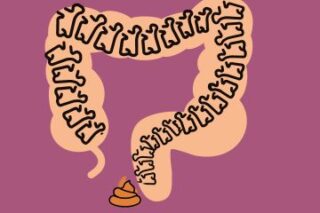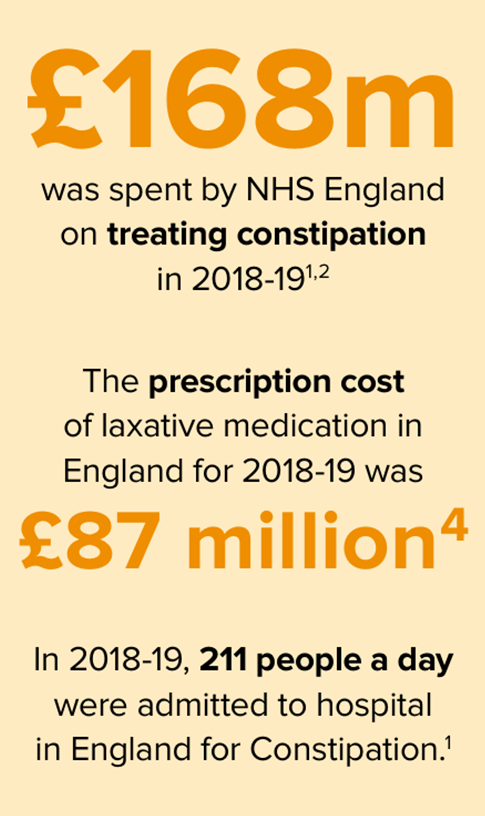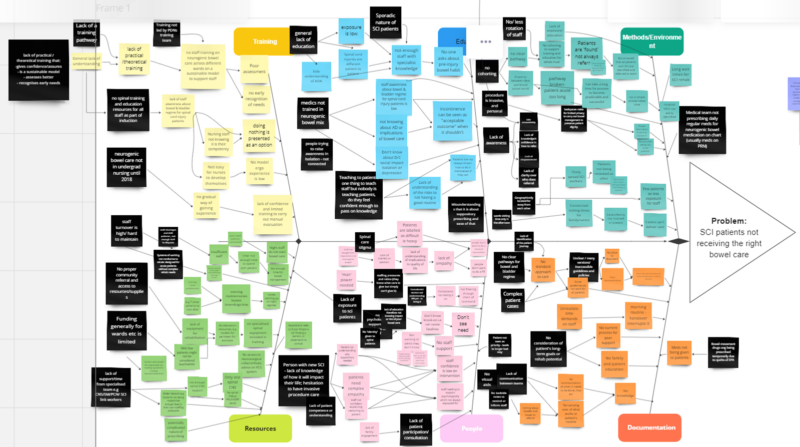Q Exchange
Neurogenic Sh1t Matters!
- Proposal
- 2024

What is the challenge your project is going to address and how does it connect to the theme of 'How can we improve across system boundaries?
Almost all people with spinal cord injury (SCI) suffer from neurogenic bowel dysfunction (NBD) including constipation, faecal incontinence, and defecation disorders.
Effective bowel management helps prevent these, having a huge impact on quality of life.
(taken from Spinal Injuries Association)
NBD care does not happen effectively in the acute setting. Patients often do not have these plans in place, or they are not carried out, leaving them at risk of developing complications.
To improve, patient education is fundamental.
Newly injured patients are unaware of the complexities of NBD. Patient education and support is only facilitated by specialist spinal injury centres and charities, leaving those in acute systems unsupported and unaware. It often takes between 4 and 12 months for patients to reach these specialist centres, and some are never transferred. There is a huge disparity across the system in the education available for patients, families and carers dependent upon their pathway.
What does your project aim to achieve?
This project aims to empower patients first and foremost to advocate for the care they need. By:
Creating educational resources available for patients on SCI after they have been newly injured, and receiving care in the acute setting. To support and empower patients to manage their own health and communicate their needs.
In addition:
- Improve education and training for staff treating patients with SCI.
- Improve educational resources available for wider staff groups, carers and families.
- Reduce rates of faecal incontinence and bowel accidents for patients. This will improve their quality of life, and staff productivity in care delivery.
- Reduce constipation rates for patients, reducing the risk of complications and the cost associated with treating constipation (see infographic below).
- Share learning and educational resources nationally.

How will the project be delivered?
We will develop of a series of accessible resources (training, videos, posters, graphics etc) to support patients to understand NBD and bowel care. These will be co-designed with people with lived experience of SCI and personal experiences of the acute setting. The intention of these will be to empower them to self-advocate and understand the need for bowel care during their hospital stay.
Using evidence identified in a longstanding QI project, we will also developing resources n tandem to empower and support staff, providing knowledge and building confidence to give bowel care (see our fishbone diagram below).
There is already a dedicated working group set up to support this project to continue delivering this work, and we will include further voices from the wider community across the SCI network, including patients.
We will develop resources iteratively with patients and staff feeding in to ensure the final products are effective.
How is your project going to share learning?
We will provide patient-first resources; downloadable videos, hand-held materials, podcasts and more to support and empower them to understand and self-advocate for bowel care. These will be focused on acute and community but downloadable for all. These materials will meet accessibility guidelines and we will offering audio described and BSL versions. These will have been designed in tandem with patients and all learning captured in each iteration will be shared. We will evaluate the impact of these in enabling patients, building confidence, knowledge and self-advocacy.
Create excellent, co-designed staff training resources that can be fully downloadable and shared across trusts nationally and the SCI network and across the system e.g from acute to community. We will evaluate these and the feedback from staff with guidance for others.
We will also spread the work, and the word at national and regional conferences and webinars and posting updates with Q community.
How you can contribute
- This month, Spinal Cord Injury specialist clinicians going to parliament to petition the government to ensure every NHS hospital has a bowel care policy. Sign the petition here! https://petition.parliament.uk/petitions/652280
- Sharing comments/ideas
- Spreading the word
- Raising the issue/championing and supporting the SCI community
- Leading by example
- Playing your part in culture change
Plan timeline
| 1 Sep 2024 | Kickoff - establish wider team communication channels and project management tools |
|---|---|
| 8 Sep 2024 | Detail project plan, including timelines, milestones, and resource requirements |
| 15 Sep 2024 | Research and planning - review existing academic material, run gap analysis |
| 1 Oct 2024 | Co-design educational resources, starting focus groups with patients and carers |
| 1 Dec 2024 | Co-design training materials tailored to nurses delivering care |
| 1 Jan 2025 | Filming videos commences |
| 17 Jan 2025 | Graphic design of patient-facing elements commences |
| 31 Jan 2025 | Graphic design of staff training packs commences |
| 31 Jan 2025 | Iterative development of patient and staff materials with each group |
| 28 Feb 2025 | Pilot developed resources with subset of patients, staff, and carers |
| 7 Mar 2025 | Finalise the developed resources based on feedback and testing outcomes |
| 1 Apr 2025 | Develop implementation plan and communications materials for patient-facing campaign |
| 1 Apr 2025 | Launch of concurrent communications campaign and staff resources |
| 6 Apr 2025 | Wider rollout of patient-facing materials, training sessions and resources |
| 30 Apr 2025 | Capture lessons, best practices & areas for improvement throughout the project |
| 5 May 2025 | Continued training dates and resource rollout across wider areas |
| 31 Aug 2025 | Share findings and outcomes and resources with Q members |
| 31 Aug 2026 | Initial evaluation / monitoring of the impact of the educational resources |


Comments
donna thompson 8 Mar 2024
Such an important project to raise awareness and education to support people with SCI with intimate healthcare needs.
Ellen Triggs 20 Mar 2024
Thank you for your reply! I am glad you agree that we need to raise awareness of how important this issue is in the health care system. I hope we are able to get the funding to make a real difference.
Many Thanks,
Ellen Triggs
Dr Gisele Lafeuillee 5 Mar 2024
Well done Ellen. Super Important to have information about neurogenic bowel management out there.
Ellen Triggs 20 Mar 2024
Thank you Dr Gisele!
I am so glad I have your support with this project and it will be great to work with you at Orpington community Hospital and hopefully if we get the funding we can utilise the learning and resources across the healthcare system.
Many Thanks,
Ellen Triggs
Katherine 4 Mar 2024
Such an important project and 100% required to improve the fundamentals of patient safety and care.
Ellen Triggs 20 Mar 2024
Thank you Katherine for your comment!
I agree, we need to raise awareness to both patients and staff in the acute setting about how important Neurogenic bowel management is to get right.
Yasmine Permaul 2 Mar 2024
Really glad to see this essential work is getting recognition. It will make such a huge difference to the quality of life for people with spinal cord injuries.
Ellen Triggs 20 Mar 2024
Thank you for your comment Yasmine.
Yes the quality of life in the acute setting as well as long term is at the heart of this project. Hopefully if we get the funding, this will help enhance the quality of life of these patients across the healthcare system!
Josie Kyan 2 Mar 2024
A great project - so important to a patients receiving care and their quality of life as a whole. I’m glad people are pushing for this and paying attention to what their patients need. Thank you!
Ellen Triggs 20 Mar 2024
Thank you Josie, for your comment!
The patients voice is at the heart of this project and it is so important to listen to.
I am glad that has come across in this project proposal!
Many thanks,
Ellen
Josie Kyan 2 Mar 2024
A great project - so important to a patients quality of life and care! I’m glad people are pushing for this and paying attention to what their patients need. Thank you!
Sophie 2 Mar 2024
This is essential work which will undoubtedly improve patient and carer experience. It’s surprising no such policies exist already!
Ellen Triggs 20 Mar 2024
Thank you Sophie!
Kings as a trust is working hard at the moment to develop a Neurogenic Bowel Policy! There is currently a big push nationally to have a neurogenic bowel policy in every trust to enhance patient care.
This is the time to promote neurogenic bowel care and the importance of it across the health care system, while all of this other work is going on nationally.
Thanks for your feedback!
Lorraine Catt 29 Feb 2024
Bowel dysfunction must have a significant impact on the quality of life and patient outcomes of the patients that are affected. The value of this project to the patient is huge and any improvements would be beneficial.
Ellen Triggs 20 Mar 2024
Hi Lorraine,
Thank you for your comment!
You are right Neurogenic bowel dysfunction does have a significant impact on a persons quality of life. It also increased their risk of Pressure sores and skin damage, especially when incontinence is not managed.
Sally Kalsi 27 Feb 2024
What a great and timely resource. High quality training resources to educate and train will significantly improve the quality of life for people with spinal cord injuries.
Ellen Triggs 20 Mar 2024
Hi Sally,
Thank you for your comment!
Yes these resources are defiantly needed to help patients and staff learn about Neurogenic bowel care.
Hopefully with the funding the videos can be engaging and educational to help promote the importance of this!
Emma Cook 26 Feb 2024
Fantastic project, offering the opportunity to build on the existing work of the QI project. Such an important issue to tackle. The indignity of incontinence after SCI and the the risk of serious complications can be avoided with more awareness, training and resources.
Ellen Triggs 20 Mar 2024
Thank you Emma for your comment!
You are right, the QI project at KCH trust is at the heart of this project. The funding will hopefully give the project the boost that is needed to develop some excellent resources that can be shared across many acute trusts and the healthcare system!
Many Thanks,
Ellen Triggs
Ellen Triggs 26 Feb 2024
Neurogenic bowel care and management is so important to get right in the acute setting!
So many patients are left to have bowel accidents and are just labelled as incontinent because of their SCI! This has a huge impact on their acute hospital experience, often causing psychological distress.
There is also a massive push at the moment to have Neurogenic bowel care recognised nationally by the Spinal Injuries Campaign aiming to get a Neurogenic Bowel Policy into every acute trust!
Please Like and Comment on this idea and spread the word!
Thank you!
Noreen Russell 26 Feb 2024
Fantastic, this would be an incredibly valuable tool for all people caring for those with a neurogenic bowel.
Ellen Triggs 20 Mar 2024
Thank you Noreen!
I agree, I think the funding for these resources that could be made to improve training and education throughout the system are so valuable to help ongoing teaching and education on Neurogenic Bowel Dysfunction and care!
Comments are now closed for this post.